No products in the cart.
NEWS
How to Start Free-range Chicken Farming: A Step-By-Step Guide, Advantages, and Disadvantages
It is a very lucrative business, and many people make money worldwide by raising free-range chickens. However, to build a successful, sustainable, free-range poultry farming business, you need sufficient knowledge, good management skills, and a business plan to raise free-range organic chickens effectively. Let’s check out how to start free-range chicken farming below.
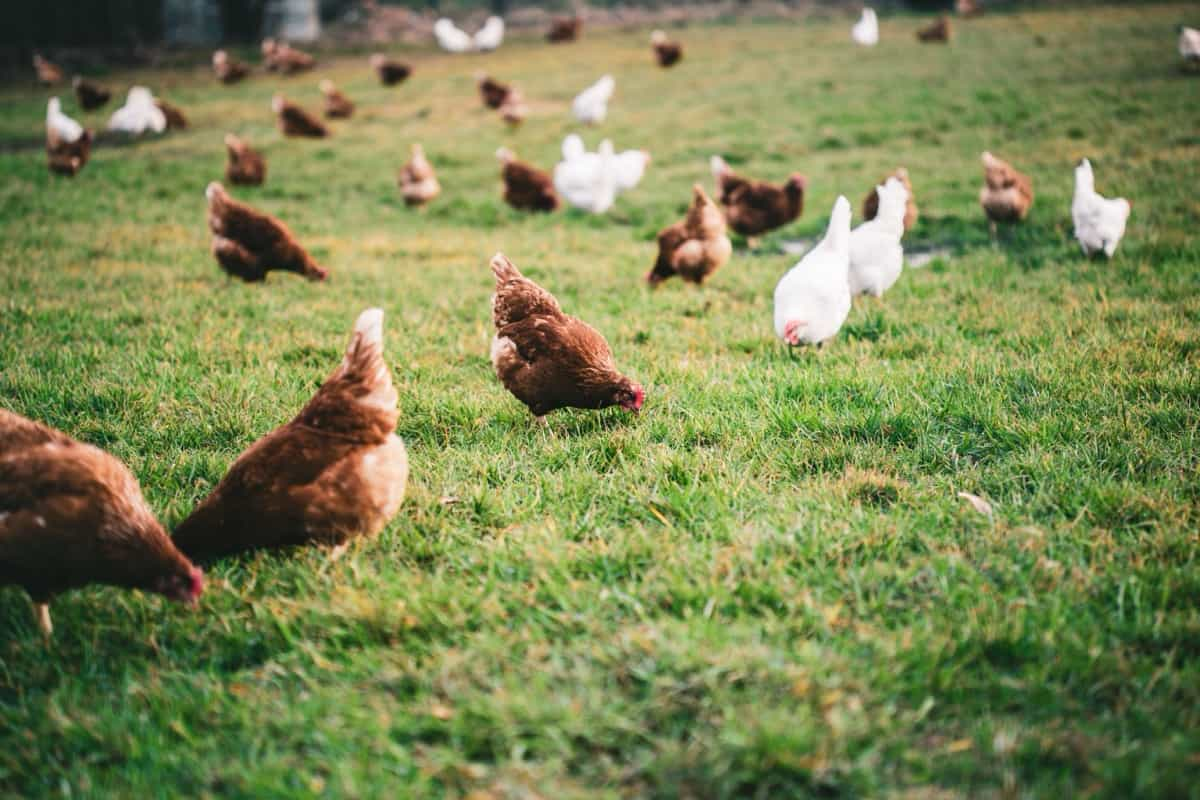
What Does Free-range Chicken Mean?
When chickens or other livestock are “free-range,” they can roam freely, with free access to outlying areas and fewer restrictions on their overall movement and housing. These animals are not limited to a small coop, warehouse, or pen; they have a much larger, more enriched space to explore. Since some legal regulations on how free-range can be officially labeled for chickens, various farmers, commercial agricultural workers, or urban homesteaders can consider their poultry free-range in different ways.
The main difference between regular chicken production farms and free-range bred chickens is the environment in which they are reared. Common farms keep chickens in tight spaces with many other chickens; this is a large-scale factory breeding environment. The same is true of chickens raised for their eggs. Their diet and conditions may or may not be purely organic. Free-range chickens can roam in low-pressure environments, outside and away from chicken coops or common residential areas. This arrangement allows the chickens to roam in nature with plenty of air, sunshine, and no stress.
In case you missed it: Earning More than 3 Lakh Per Month: A Success Story of Kadaknath Chicken Farmer
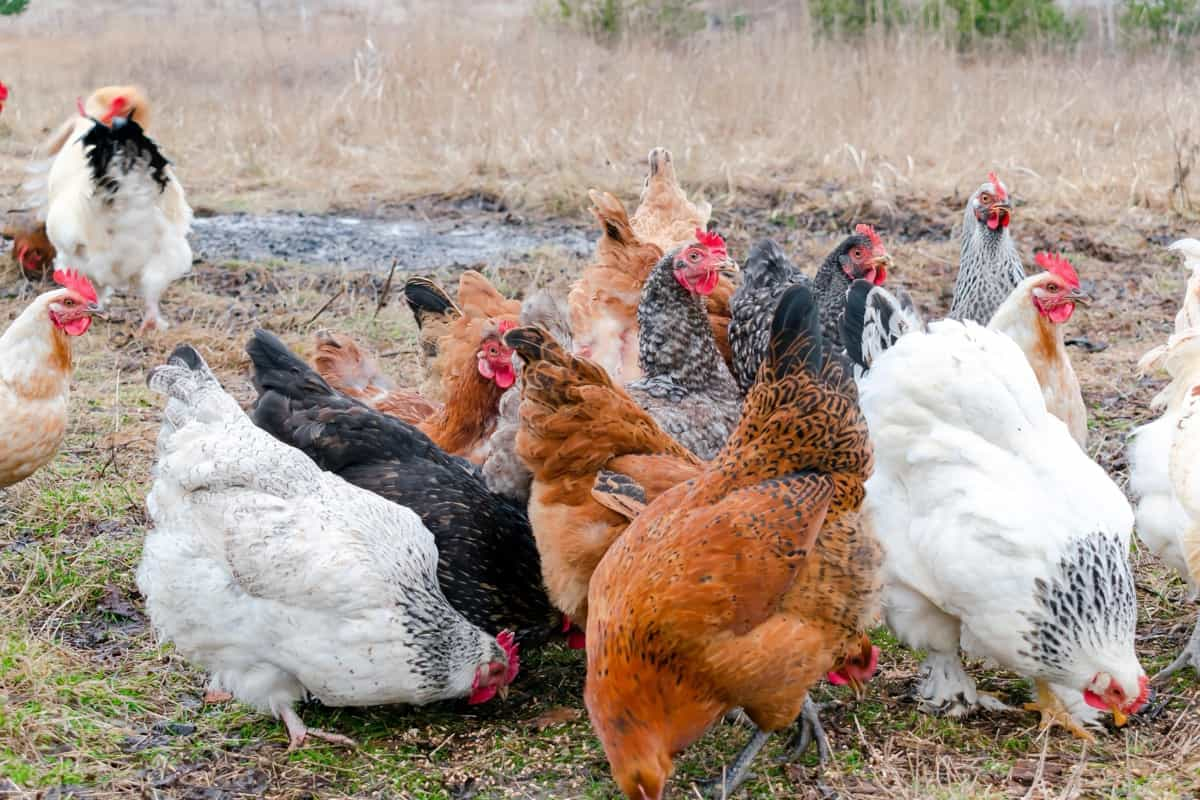
Benefits of Free-range Chickens
There are several benefits to raising free-range chickens. Because birds are not confined to small areas, they get more exercise; their flesh has more muscle and protein in their limited habitat than these birds. Free-range chickens generally have lower fat and calorie content in their meat and eggs, and many consumers believe that free-range chickens and their eggs taste better and fuller.
Better health helps birds be more resistant to pests and diseases, although they may be more susceptible to predators. With more room to roam, free-range chickens have anxiety, aggression, and territoriality problems, even with large flocks. The cost of caring for free-range chickens can also be less than that of a confined flock. Because birds naturally feed on a wide range of food, there is less need for expensive feed or extra pellets.
Free-range chickens will also control natural pests in gardens or landscapes as they snatch away all kinds of insects, weeds, and seeds, and their natural beaks, scrapes, and digs will sprout into the soil. Their pulp becomes the best fertilizer. A large flock can lead to a dirty or bad rebel area; however, be aware of the consequences before releasing the birds. Free-range chicken tastes better and has more protein due to better breeding conditions. The best breeding equals the best health.
Chickens that spend free time outside with better exercise, clean air, clean water, and plenty of sunshine are the best sources of natural meat products. On the farm or in, the free-range chickens on your farm can benefit your landscape. Farmers use mobile chicken pans to move chickens on their farmland.
Chickens feed on insects and eat leftover crops such as lettuce and other vegetables that fertilize the soil simultaneously. It creates a symbolic relationship between animals and the land. A few free-range chickens can help reduce pests in the garden and provide you with a fertilizer source.
- Broader diet – Free-range chickens can feed on insects, grasses, and weeds. Their diet will be much more diverse than that of captivity. It makes them happy and healthy chickens.
- Low feed cost – Since chickens are foraging, this will increase some of their feed. You will need to give them chicken feed, but free-ranging will reduce the amount. Saving money is always a good thing in life.
In case you missed it: How this Farmer Made 24 Lakh Profit from Country Chicken Farming – A Success Story
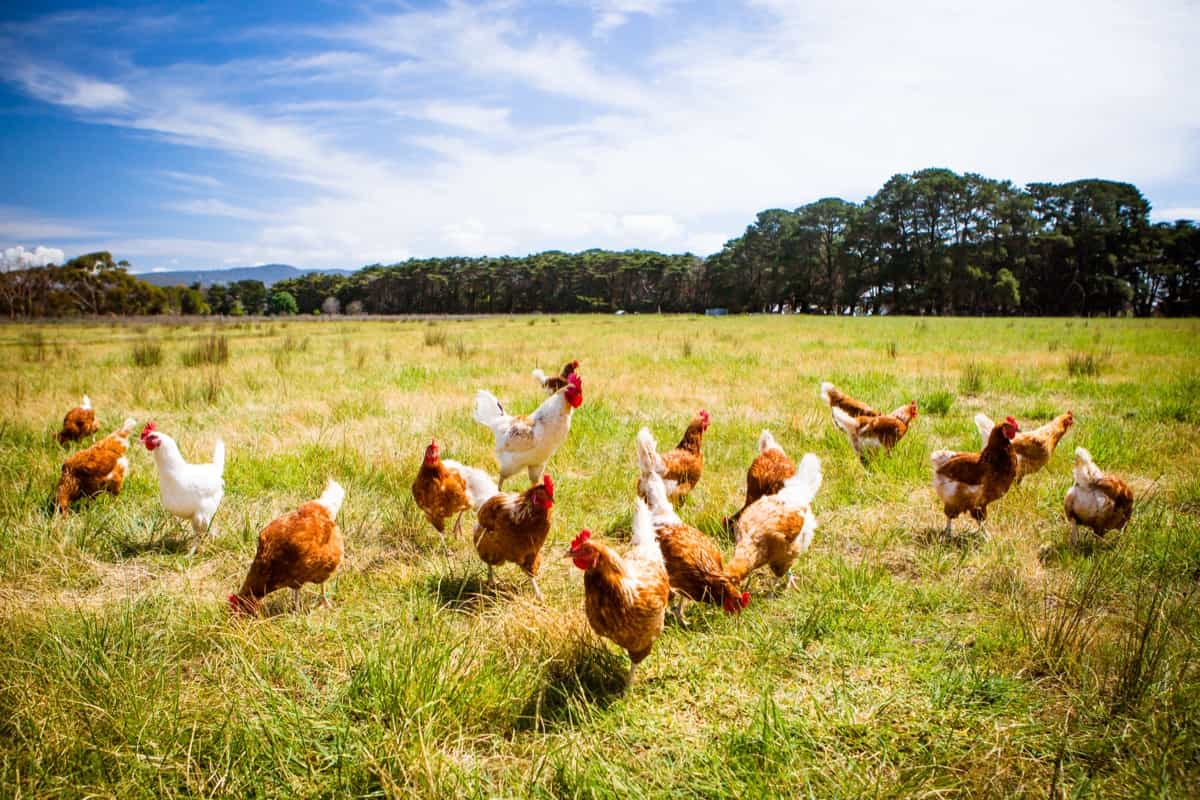
Land, House, and Equipment Needed
The type of housing you need and the size of this property will depend on your poultry endeavor. When choosing a poultry business location, you want to balance the cost of the property, labor costs, safety, and the need to be close to the market, along with excellent water sources.
When you plan to build a free-range chicken house, you must choose a well-drained place with lots of fresh air circulation. Proper housing must have adequate ventilation and proper lighting. Ventilation is necessary to allow adequate air exchange. To make eggs all year round, you must put proper lighting in your facility. You must have the equipment, including feeders, drinkers, lighting systems, and nest boxes.
Housing Requirements
As well as choosing the right site and providing enough space for chickens, adequate housing management is an important step in starting a chicken farming enterprise. Ideally, just like outdoor pastures, you should aim for one square foot per hen according to the density of your stock. However, two hens per square foot are also acceptable if you have limited space. The chicken house should be open both inside and outside so the chickens can easily access the outside pasture. Preferably, it should be high and well-ventilated.
Chicken Breeds Suitable for Free-range Farming
- Local chicken breeds or crossbreds of Rhode Island x local chickens
- Chinese chicken breeds such as Tam Hoang or Luong Phuong
- The Israeli Kabir chickens
There are many different chicken breeds, and choosing the right breed will depend on your needs. You can sell meat and eggs or run a free-range chicken business for meat and eggs.
- Rhode Island Red Chicken can be raised with both meat and eggs. They lay about 250 eggs a year. The Light Sussex chicken breed is a dual-purpose breed for meat and egg production.
- White Leghorns are commonly used as layer birds. They can lay 300 eggs yearly, weighing at least 55 grams. The Boschveld chicken breed is commonly found in Africa and can withstand various climatic conditions.
- Welsummer can be a little taller with his beautiful plumage. But if picked up correctly, they will be quite friendly and attentive. They are also good herdsmen and prefer to stay out during the day instead of sitting in the coop.
- Buckeye is a hardy chicken breed and can be a little aggressive. They do not incarcerate at all and need free-range. These chickens are fine even if it is written as long as they can move.
- Minorca is the largest breed of chicken in the Mediterranean. They are also easy to handle and more friendly than the rest of the class. They will endure imprisonment, but doing so may hurt them a little. They prepare fodder on top and happily pecking, scratch, and eat insects.
- Many other breeds exist, including the Golden Comet, Ameraucana, Barred Plymouth Rock, Golden Laced Wyandottes, Australorp, and more.
- The breeds used in free-range chicken farming are also different from these chickens. The most commonly used breeds in free-range chicken farming are Kabir and Sasso chickens, and they grow a little slower than those living inside the poultry house but are bigger and heavier.
In case you missed it: Broiler vs Layer – Chicken Differences, Management
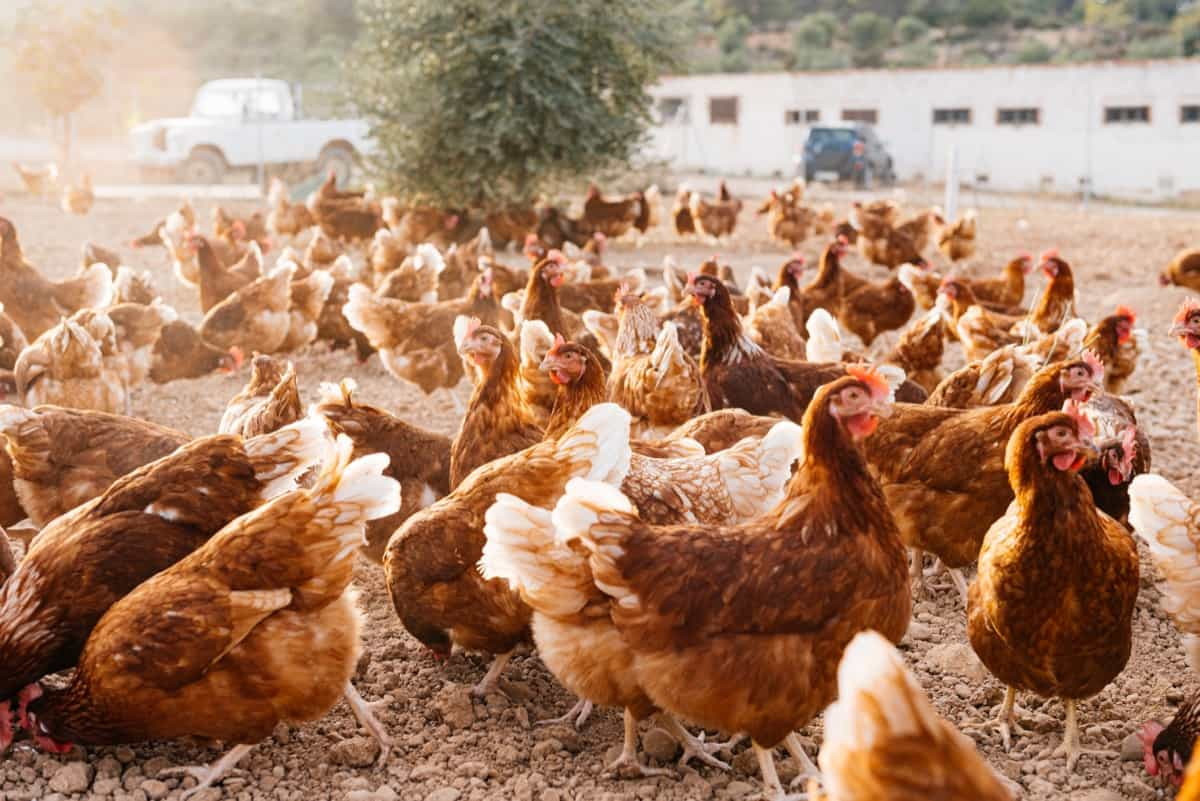
Equipment for free-range chicken farming
In addition to fencing and building a house for just one range of chickens, you will also need to purchase various equipment to help the chickens. It would help if you bought drinkers, feeders, brooding equipment, heaters and heating bulbs, and chicken plucker machines.
Feed and nutrition for free-range chickens
Free-range chickens must be fed to increase meat and egg production. Lack of water or feed will reduce resistance to diseases and parasites and increase flock mortality. In a free-range poultry system, adult chickens should be given ample time and space to clean the surrounding environment daily.
The best time to clean is in the early morning and late afternoon, when there are plenty of insects and the heat, is low. Generally, supplementary feeds must be offered in the morning and evening when free-range chickens return for the night. For birds’ growth, clean water should be provided in shaded regions during the day to avoid heat stress. You will also need appropriate vaccines and medications to prevent disease and promote the breeding of your free-range chickens.
In case you missed it: Using Chicken Manure In Garden – As Fertilizer
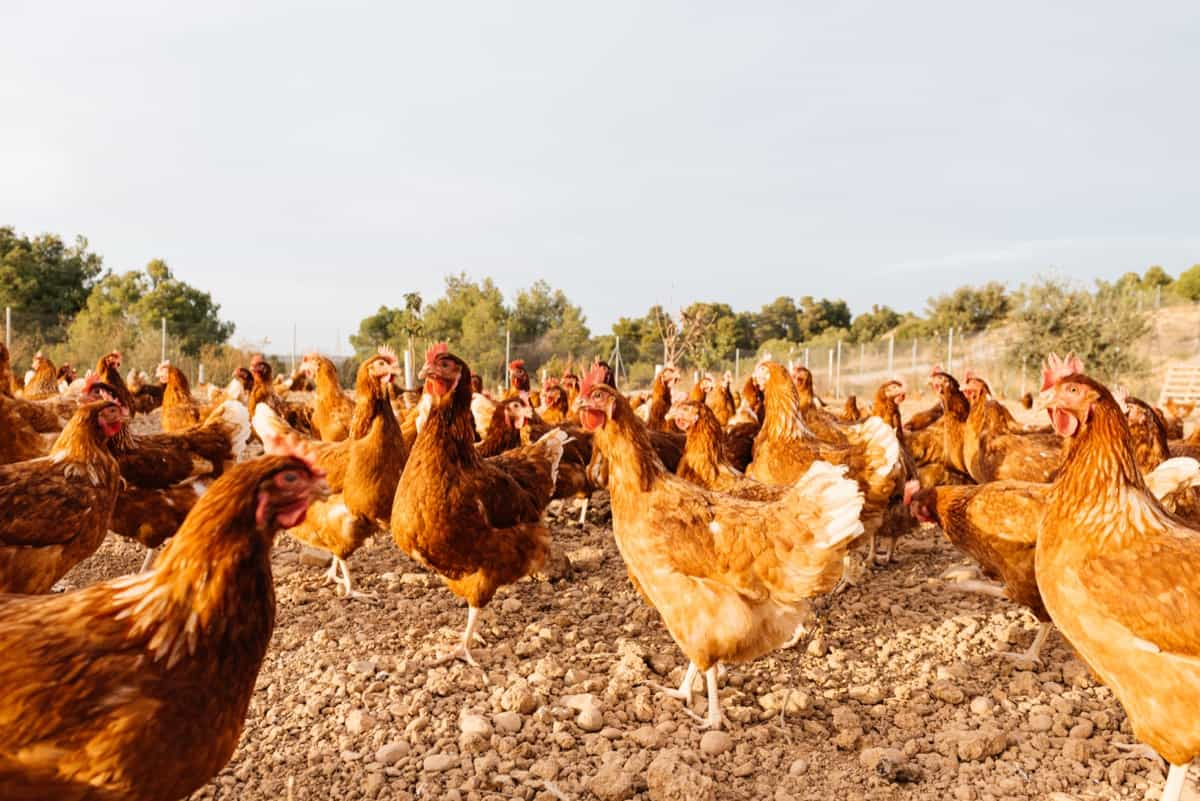
The advantage of raising free-range chickens is that they will get most of their food from the cleanliness of the surroundings. It reduces feed costs. However, keeping free-range chickens for commercial purposes is insufficient to feed on the surrounding fodder. You will want to supplement the free-range chickens’ diet with commercial stock feeds or home feed. You can also give them corn, millet, wheat, rice, etc.
Tips for Free-range Chicken Care
Provide shelter: Even free-range chickens need shelter at night and protection from bad weather. A strong coop should be available for the flock; a large herd or several coops can be planted in different areas to allow more bird choice.
Provide supplemental food: Free-range chickens will feed on their own, but providing supplemental food can provide good nutrition and vitamins needed for a healthy flock. The feed can also train the chickens and return them to the coop at night for safety.
Keep vaccinations current: Free-range chickens are more likely to contact other wildlife, ticks, or insects that can transmit the infection. Keeping birds up-to-date on vaccinations and worms will keep the whole flock healthy.
Management and Labor Required
The number of farm workers will depend on the free-range chicken size. If you run a small business like 100 birds/cycle, you and your family may have enough to take care of the chickens. However, if you are raising 2,000 birds per cycle, you will need full-time staff to manage free-range chickens. Business success requires good technical knowledge of free-range poultry farming techniques. You also need good management skills.
The Market for Free-range Chicken Meat and Eggs
The free-range chicken market is increasing as more people move towards organic and healthy food. People mostly prefer organic free-range chicken meat to broiler chicken meat. Thus, the free-range organic chicken meat demand is constantly increasing. Free-range chickens cost more than broiler chickens because they are considered higher. Free-range hen eggs are also considered better than commercial indoor-layer hen eggs. Free-range chicken eggs are highly nutritious, delicious, organic, and healthy.
In case you missed it: 1000 Broiler Chicken Farming Project Model Report
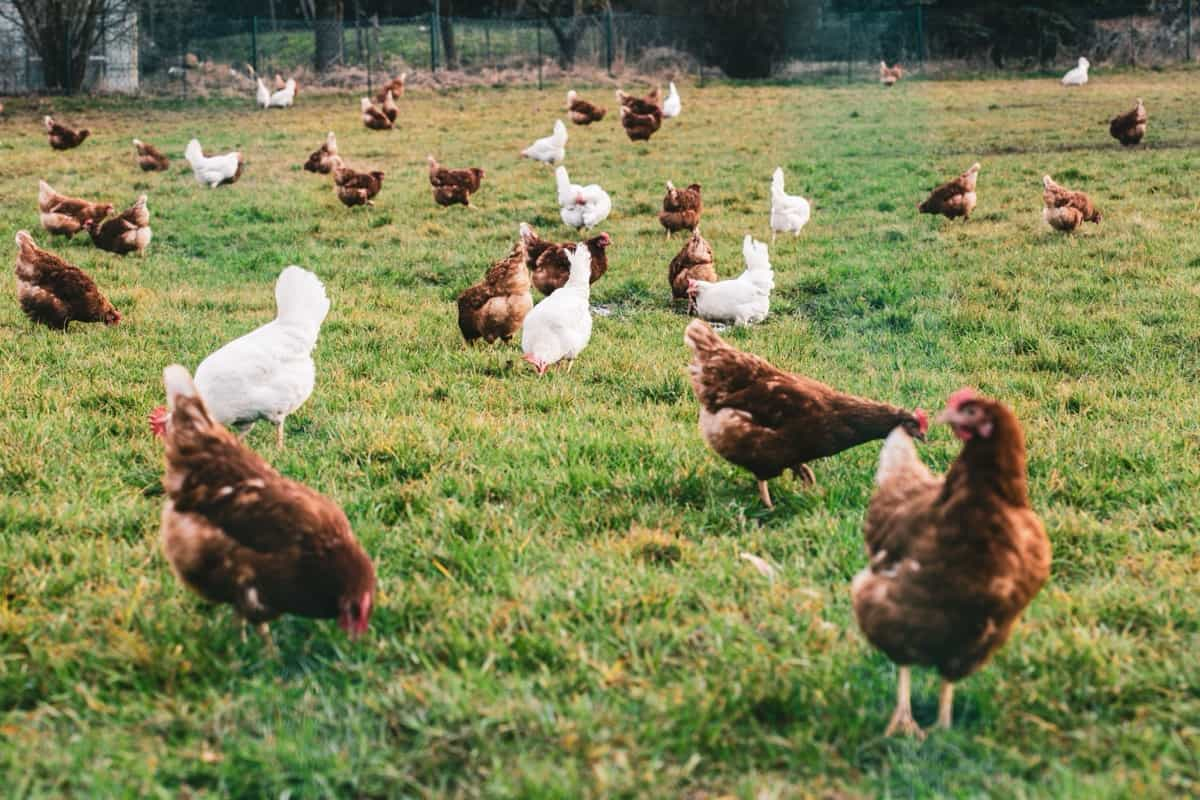
The price of free-range organic eggs is higher compared to that of ordinary chicken eggs. You can deliver free-range chicken meat and eggs to individual households, butchers, schools, restaurants, companies, supermarkets, organizations, events, and more. You can sell your free-range chickens as live birds, slaughter them, and freeze and sell them as dressed chickens. You can export your free-range organic products as you grow your chicken farming business.
Disadvantages of Free-range Chicken Farming
Free-range chickens can mess with your backyard – Chickens like to scratch the ground in search of insects or while bathing in the dust. It is common in chickens, but when they scratch the ground too much, it can damage your landscape, yard, or garden. So, before you let your birds roam, ensure your landscape is well protected.
Eating unwanted plants (garden, flowers, herbs, etc.) – If you or your neighbor has a garden and your chickens find it, they will benefit from free food. Also, they will eat some flower pedals and herbs if you are not careful. By giving their birds home-grown produce, they will be tempted to seek out this kind of invitation and create even greater heights to go to the garden.
Free-range chickens as soon as possible make it difficult to collect eggs – Although these birds are known to produce nutritious eggs, they make it difficult to collect these valuable commodities. Most choose to lay their eggs in hidden places around the yard. Hunting eggs can be frustrating if you don’t know where to start. It would help if you had several much-needed areas around the yard to overcome this problem. This way, you will save time as your hens will be left in special places where you can easily find their eggs.
Raising free-range chickens can be challenging, but it can benefit a stronger, healthier, more productive flock. The free-range system is best suited for small-scale farmers who raise chickens for domestic and commercial use. This low-cost free-range system increases the commercial value of poultry products. The above steps are useful for starting free-range chicken farming.
- Organic Farming vs. Natural Farming (ZBNF): Key Principles and Differences
- Strawberry Nursery Establishment and Management
- Modi Vision for Indian Agriculture
- Government Support and Policies for ZBNF in India
- Deworming Schedule for Sheep: A Beginners Guide
- Ultimate Guide to Beans Farming in Kenya: From Planting to Profits
- Ultimate Guide to Natural Vegetable Farming
- Natural Farming for Sustainable Livestock Management
- Dairy Farm Technology in India: The Future of Dairy Husbandry
- Comprehensive Guide to Organic Farming in Villages
- Modern Sheep Farming Technology: The Future of Sheep Husbandry
- Goat Farming Technology: The Future of Goat Husbandry
- How to Build a Low-budget Goat Shed: Cheap Ideas and Tips
- Goat Farming Training Programs in India: A Beginner’s Guide
- Types of Pesticides Used in Agriculture: A Beginner’s Guide
- Economical Aquaculture: A Guide to Low-Budget Fish Farming
- 15 Common Planting Errors That Can Doom Your Fruit Trees
- How to Make Houseplants Bushy: Effective Tips and Ideas
- Innovative Strategies for Boosting Coconut Pollination and Yield
- Pollination Strategies for Maximum Pumpkin Yield
- The Complete Guide to Chicken Fattening: Strategies for Maximum Growth
- Natural Solutions for Tulip Problems: 100% Effective Remedies for Leaf and Bulb-Related Issues
- Revolutionizing Citrus Preservation: Towards a Healthier, Greener Future
- Natural Solutions for Peony Leaf and Flower Problems: 100% Effective Remedies
- Maximizing Profits with Avocado Contract Farming in India: A Comprehensive Guide
- Natural Solutions for Hydrangea Problems: 100% Effective Remedies for Leaf and Flowers
- The Ultimate Guide to Choosing the Perfect Foliage Friend: Bringing Life Indoors
- From Sunlight to Sustainability: 15 Ways to Use Solar Technology in Agriculture
- The Ultimate Guide to Dong Tao Chicken: Exploring from History to Raising
- The Eco-Friendly Makeover: How to Convert Your Unused Swimming Pool into a Fish Pond
- Mastering the Art of Delaware Chicken Farming: Essentials for Healthy Backyard Flocks
- 20 Best Homemade Fertilizers for Money Plant: DIY Recipes and Application Methods
- How to Craft a Comprehensive Free-Range Chicken Farming Business Plan
- Brighten Your Flock: Raising Easter Egger Chickens for Beauty and Bounty
- How to Optimize Your Poultry Egg Farm Business Plan with These Strategies
- Subsidy for Spirulina Cultivation: How Indian Government Schemes Encouraging Spirulina Farmers



